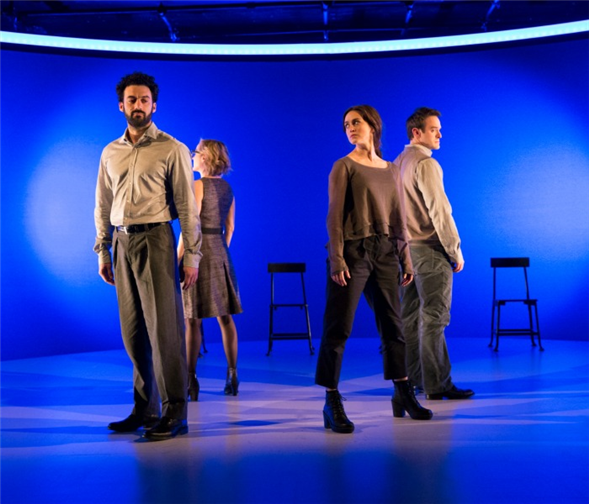Translate Page

One writer examines the explosion of science plays
---
Less than a week after Lucy Prebble's anti-depressant-fueled romance The Effect closed Off Broadway, Ana Nogueira's Empathitrax, about a relationship-enhancing drug, is opening at HERE Arts Center. Is there something in the water? Possibly. But more likely, these productions are just part of the thought-provoking new wave of science-tinged shows. Whether peeling back the layers of the human brain (Nick Payne's Incognito), expounding on the infinite possibilities of quantum mechanics (Payne's Constellations), or mournfully confronting the pitiless but inescapable nature of genetics (Deborah Zoe Laufer's Informed Consent and Sharr White's The Other Place), the Science Play has become a pillar of contemporary theatre. In fact there are so many, sites are compiling lists of them!
Forerunners of the modern Science Play have been around for centuries. Yet the genre has truly blown up over the past few decades, starting in 1993 with Tom Stoppard's Arcadia. In this much-celebrated masterpiece, Stoppard compares two instances of past and future, joining the story lines with discussions of thermodynamics, chaos theory, and fractals. (Look them up. They're fun!) The knighted British scribe weaved high-minded concepts with emotional truth so flawlessly, it's no wonder his peers followed suit. Then American dramatist David Auburn's Pulitzer Prize-winning Proof, about a mathematician struggling with her unstructured mind, bowed on Broadway in 2000. And the rest, as they say, is history.
Why is science so suited for exploration on the stage? Perhaps because it's treated more seriously than in other forms of entertainment. On television, even series with scientists in leading roles like The Big Bang Theory are more about awkwardness than understanding. And aside from documentaries, science in cinema frequently falls under the jurisdiction of sci-fi. While these movies often pose ethical quandaries, they rarely seek to enlighten viewers about recent scientific discoveries and usually require a healthy dose of suspension of disbelief.
Superficially, theatre may seem like the antithesis of science -- feeling versus thinking, fantasy versus reality. But, as a playwright myself, I think that scientists and theatre makers have a lot in common: We're always strapped for cash; have lofty, near-unattainable goals; and we were all probably picked on in junior high. Joking aside, perhaps the answer is less complicated than it appears. The concepts of science usually appeal to a less mainstream, more erudite crowd. Through that lens, science and theatre seem like an inevitable match -- plays about highbrow topics for highbrow audiences.
Or maybe it's not that simple. What sets the Science Play apart from other genres is that it's one person's reaction to a discovery made by another. It's only in the modern era that science has been recognized as the most authentic (or perhaps, least flawed) form of knowing. Scientists make discoveries that scare us, excite our sense of wonder, and, most importantly, reflect the world as it is. By the same token, theatre exists not only to entertain, but to advance the search for truth. It is this insatiable appetite for truth that inspires someone to experiment with center stage or a centrifuge. If neurology implies that free will is an illusion manufactured by the brain, playwrights want to explore it. If biology suggests that humans are inherently violent creatures, we want to examine it. And if physics indicates we may exist across multiple universes and dimensions, weaving in and out of a beautiful quantum tapestry, we want to ruminate on that, too. Theatre makers know that it's more important to challenge audiences than to comfort them. Revelations can be distressing, troublesome, and provoke existential crises -- in other words, a perfect fit for the stage.
---
Sander Gusinow is a freelance writer and playwright based in New York.
Top image: The cast of Incognito by Joan Marcus
TDF MEMBERS: Browse our discounted tickets to theatre, dance, and concerts.